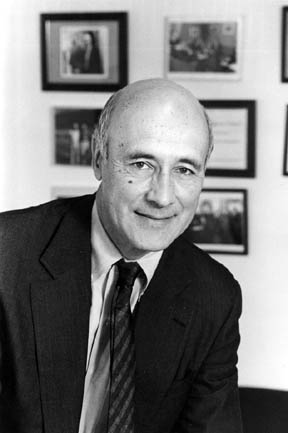|
Web Exclusives: Alumni Spotlight
February 12, 2003:
The
limits of power Joseph S. Nye Jr. '58 was about 90 percent through writing his latest treatise on American diplomacy and foreign policy when terror shocked the nation on September 11, 2001. No one in academia could have predicted those events, of course, but they only underscored the points that Nye was looking to make. In The Paradox of American Power: Why the World's Only Superpower Can't Go it Alone, Nye argues that while the supremacy of American power is beyond challenge, unilateral action is unwise in an era when the gravest threats are posed by terrorism. "There is a danger that we would be led to believe that we are less in need of other countries," Nye said. "It's still much better to work as a broad coalition. The timing of the book I think was right." Nye points out that many of the biggest challenges of the modern day — everything from global warming to drug addiction to terrorism — are precisely the sorts of things that don't respond to economic and military might. And so America's future would be best served in patient cooperation with other nations, he argues, with influence wielded through culture and values rather than bombs and embargoes. Nye's views have been honed over decades of work both inside and outside of government, in some of the top-ranking posts of academic life and the realm of national security. Nye joined the Harvard faculty in 1964, after earning a Rhodes scholarship and a Ph.D. in political science from Harvard, and his career at Harvard has been interrupted only by stints serving Democratic presidents. He was a specialist on national security and nuclear weapons in the Carter administration's State Department, and was chairman of the National Intelligence Council under President Clinton. For seven years, Nye has been the dean of Harvard's John F. Kennedy School of Government. He still usually teaches one seminar a year at the Kennedy School, though much of his time is dedicated to fundraising, recruiting faculty, and shaping the school's direction. Nye coined the term "soft power" to describe his views on international theory, saying that nations can achieve there international aims best by "co-opting people rather than coercing them." Nye's 1989 book, Bound to Lead, brought him wide acclaim for its prescient prediction that the United States was on the cusp of unprecedented power — a view that stood in contrast to the then-popular view that the nation was headed toward decline with the rise of Japan and other nations. He correctly identified the U.S.'s real challenge as how to wield its international power, not how to maintain its spot atop the mountain. Nye credits Princeton's Woodrow Wilson School for launching what's become among the most impressive careers to span academia and government. At Princeton, he said, he was able to intertwine his interest in politics, economics, and history, all with an eye toward the practical application of the theoretical. For a man who has moved so seamlessly between theory and practice, it could hardly have been a better education. "I still hearken back to things I learned at Princeton," Nye said. "It gave me a tremendous base for the things I went on to do." He hasn't settled on his next
project yet, and for now, he's enjoying the measure of commercial
success the latest book has brought him. As long as he's proven
right, his will be a voice to be listened to for years to come,
whether he's bending the ear of the public or the president. By Rick Klein '98 Rick Klein is a reporter for the Boston Globe.
|
||

